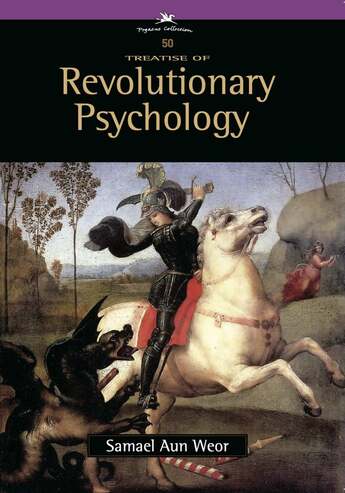Chapter 8: Wrong StatesUnquestionably, in the rigorous observation of the “myself,” it is always urgent and unpostponable to make a complete logical differentiation between the external occurrences of practical life and the intimate states of the consciousness.
We urgently need to know where we are situated in a given moment, as much with respect to the intimate state of the consciousness, as to the specific nature of the external event that is happening to us. Life itself is a series of occurrences which proceed through time and space. |
It has been said, “Life is a chain of torments that man carries entangled in his Soul.”
Everyone is very free to think as he wishes. I think that the ephemeral pleasures of a fleeting moment are always followed by disenchantment and bitterness.
Each event has its special characteristic flavor, and the internal states are likewise distinctive, this is incontrovertible, irrefutable.
Certainly, the internal work on oneself emphatically refers to the diverse psychological states of the consciousness.
Nobody can deny that within, we carry many errors and that wrong states exist.
If in truth we really want to change, we need with the utmost and unpostponable urgency, to radically modify those wrong states of consciousness.
The absolute modification of erroneous states causes complete transformations in the field of practical life.
When one works seriously on the wrong states, obviously, the disagreeable events of life can no longer hurt one so easily.
We are saying something that it is only possible to comprehend through living it, really feeling it in actual fact.
He who does not work on himself is always a victim of circumstances, like a wretched log tossed on the stormy waters of the ocean.
Events change incessantly in their many combinations. They come one after another in waves. They are influences.
Certainly, there exist both good and bad occurrences. Some events will be better or worse than others.
To modify certain events is possible; to alter results or modify situations is certainly within the realm of possibility. However, there exist in fact, some situations which in truth cannot be altered.
Such cases need to be accepted consciously, although some are very dangerous and even painful.
Unquestionably, pain disappears when we do not identify with the problem that has presented itself.
We must consider life as a succession of internal states. An authentic history of our own personal life is made up of these states. On reviewing the totality of our own existence, we
can verify for ourselves in a direct manner, that many unpleasant situations were made possible thanks to wrong internal states.
Although Alexander the Great was always temperate by nature, he gave in due to pride, to the excesses that brought about his death.
Francis the First died due to a vile and detestable adultery, which is still remembered in history.
When Marat was assassinated by a depraved nun, he died arrogant and envious, believing himself to be absolutely just.
The ladies of the Parc des Cerfs unquestionably totally exhausted the vitality of the terrible fornicator, known as Louis the Fifteenth.
Many are the people who die due to ambition, anger, or jealousy, this is well known to psychologists. Inasmuch as our will endorses an absurd tendency, we become candidates for the cemetery.
Othello, due to jealousy, became an assassin, and prisons
are full of sincerely mistaken people.
Everyone is very free to think as he wishes. I think that the ephemeral pleasures of a fleeting moment are always followed by disenchantment and bitterness.
Each event has its special characteristic flavor, and the internal states are likewise distinctive, this is incontrovertible, irrefutable.
Certainly, the internal work on oneself emphatically refers to the diverse psychological states of the consciousness.
Nobody can deny that within, we carry many errors and that wrong states exist.
If in truth we really want to change, we need with the utmost and unpostponable urgency, to radically modify those wrong states of consciousness.
The absolute modification of erroneous states causes complete transformations in the field of practical life.
When one works seriously on the wrong states, obviously, the disagreeable events of life can no longer hurt one so easily.
We are saying something that it is only possible to comprehend through living it, really feeling it in actual fact.
He who does not work on himself is always a victim of circumstances, like a wretched log tossed on the stormy waters of the ocean.
Events change incessantly in their many combinations. They come one after another in waves. They are influences.
Certainly, there exist both good and bad occurrences. Some events will be better or worse than others.
To modify certain events is possible; to alter results or modify situations is certainly within the realm of possibility. However, there exist in fact, some situations which in truth cannot be altered.
Such cases need to be accepted consciously, although some are very dangerous and even painful.
Unquestionably, pain disappears when we do not identify with the problem that has presented itself.
We must consider life as a succession of internal states. An authentic history of our own personal life is made up of these states. On reviewing the totality of our own existence, we
can verify for ourselves in a direct manner, that many unpleasant situations were made possible thanks to wrong internal states.
Although Alexander the Great was always temperate by nature, he gave in due to pride, to the excesses that brought about his death.
Francis the First died due to a vile and detestable adultery, which is still remembered in history.
When Marat was assassinated by a depraved nun, he died arrogant and envious, believing himself to be absolutely just.
The ladies of the Parc des Cerfs unquestionably totally exhausted the vitality of the terrible fornicator, known as Louis the Fifteenth.
Many are the people who die due to ambition, anger, or jealousy, this is well known to psychologists. Inasmuch as our will endorses an absurd tendency, we become candidates for the cemetery.
Othello, due to jealousy, became an assassin, and prisons
are full of sincerely mistaken people.


